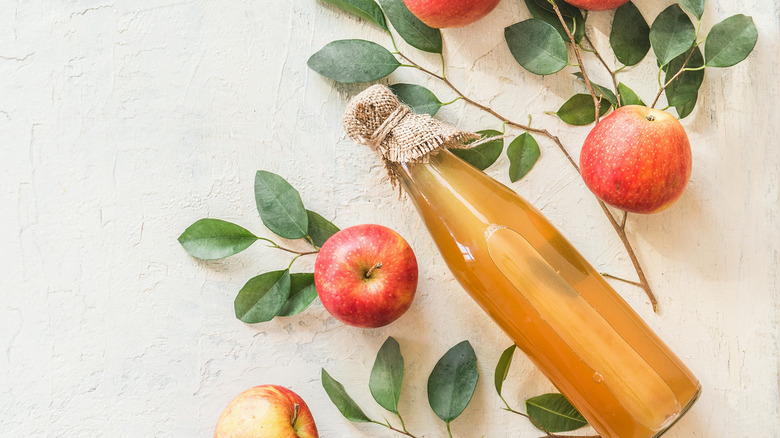Simple Ways To Sneak More Apple Cider Vinegar Into Your Diet
Apple cider vinegar (ACV) has been used in many ways, including use in food recipes and home remedies. According to WebMD, apple cider vinegar is primarily made of apple juice, however, once yeast is added to the juice, it turns the sugars into alcohol through a process called fermentation. During this process, the alcohol turns to acetic acid by bacteria, which gives the vinegar its strong, sour odor and taste. Because apple cider vinegar is highly acidic, it's recommended you don't consume it by itself.
One of the many reasons apple cider vinegar is so popular is because it offers many health benefits. According to the University of Chicago Medicine, apple cider vinegar may lower blood glucose levels, may help a person lose weight, and may control bacteria found on salads. While beneficial, ACV can't cure health problems, such as killing cancer cells or controlling high blood pressure (via University of Chicago Medicine). Typically, the benefits of apple cider vinegar are quite modest, so keep up with your daily medications as recommended by your doctor.
How to add apple cider vinegar to your diet
If you're wanting to add more apple cider vinegar to your diet, you can simply add it to your food and drink recipes. According to PopSugar, when added to smoothies, the taste of apple cider vinegar is masked, so you can still reap its benefits without the overwhelming aroma. One tablespoon is usually a good amount to add to any smoothie, but it'll likely taste best with flavorful ingredients, such as banana or nuts. Avoid using apple cider vinegar in smoothies that are more citrus-based due to the amount of acid (via PopSugar).
In addition to smoothies, you can add a small amount to your salad dressing or make a homemade vinaigrette as a healthier alternative to other salad dressings. Plus, apple cider vinegar can be added to drinks, however, you'll want to follow a similar rule to smoothies. Apple cider vinegar will taste better mixed with other ingredients, like apple juice or vanilla, instead of simply diluting it with water (via PopSugar).
Check with your doctor first before using apple cider vinegar if you're taking medications. According to BBC Good Food, people who take diuretics or water pills or have stomach issues may be adversely affected by ACV. Be sure to dilute the vinegar properly before using it and never use too much, as it can damage the enamel on your teeth (via BBC Good Food).

